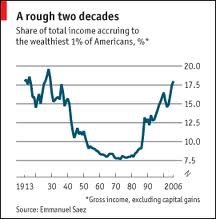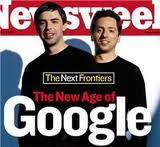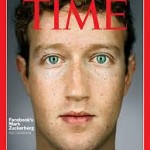Internet as Monopolistic Paradise
Digital Disconnect; How capitalism is turning the internet against democracy, Robert W. McChesney, 2013
This book is really depressing. If you are at all suicidal you may want to pass this one up. Mercifully, the book is relatively short. About half the book is given to the death of the forth estate, journalism. McChesney attributes this death, not to the internet, but to the media “consolidation” that preceded the public introduction of the internet. Once a handful of huge corporations got control of newspapers, television stations, and cable operators, they slashed costs, fired the journalists and killed journalism. He estimates that 85% of what passes for news on television and in newspapers and magazines are unattributed press releases from corporations and the government. No one has the staff to fact check or even edit these pieces, rendering the “news” organizations pure distribution channels for the corporation and government, i.e. propaganda arms. The absence of journalism allows unparalleled levels of corruption and scandal to go unreported and unknown by the public. The corporations and government both enjoy operating with complete impunity and secrecy. Add to this Obama’s acceleration of classification of documents and his war on whistle blowers and you have a prescription for producing one of the most ignorant publics in the world.
Wasn’t the internet supposed to give us better journalism by making production and distribution of news free? For 150 years journalism has been supported by an advertising model where sponsors were willing to pay to have their ads appear in targeted magazines, newspapers, and news broadcasts. A funny thing happened with the introduction of the internet. As late as 2000 Google had no idea how it was going to monetize its search service and make Google profitable. For Facebook the date of this discussion was much later. The answer for both was to collect personal information from their customers, give that information to corporate (and government) touts who would pay to have their ads or infomercials delivered to a targeted audience of one. The touts proved to be total agnostics about where their increasingly intrusive information appeared (porn sites or news sites) so long as the target met the appropriate (secret) criteria. Advertisers or propagandists no longer needed to subsidize journalism and journalists today have no viable means to support themselves.
McChesney documents that European countries use public subsidies to support journalism with no apparent cost to democratic government. Germany, followed by Scandinavia have the highest levels of subsidy and are among the most economically egalitarian in the world. With corporate control of government, public subsidy of journalism has no chance in this country. The US used to subsidize news distribution via low postal rates for delivery of newspapers and magazines. McChesney estimates that the equivalent government subsidy in today’s dollars would amount to $35 billion annually, enough to support considerable internet journalism. Instead the government today spends $5 billion a year on defense public relations.
McChesney spends some time documenting the unprecedented concentration of wealth in this country. He concludes that the secret to accumulating wealth is monopoly, the elimination of all competition. 40% of Americans have only one choice for broadband internet access. A sizable percentage of Americans have no broadband access at all available because the controlling companies have deemed them insufficiently profitable to serve (too poor or too remote). In the early days of electricity and telephones, the government, through subsidies and regulation, made sure almost everyone who wanted it had access to affordable power and phones regardless of where they lived. Today, a few enlightened small municipalities unserviced by the giants have built their own broadband networks. In reaction, ALEC inspired legislation has been passed in 19 states to make community broadband illegal. What a country. The giants have also been allowed to monopolize the public airwaves often warehousing the spectrum with no use. Television broadcasters increasingly move popular broadcasts (sports and entertainment) to their cable subsidiaries or to satellite providers. A large portion of public airways broadcasting today are paid advertisements with no content whatever. And those are the public’s airwaves.
Far from promoting innovation, the monopoly giant corporation is best at suppressing innovation. Television was delayed at least 20 years by American corporations (RCA). Likewise DSL was invented by BellCore in 1988 but it was 20 years before DSL found its way to our house via baby bell Qwest. So much for innovation. Our cell networks are at least a generation behind the rest of the world and provide lousy service at astronomical public cost. We live in the heart of Phoenix and get no usable cellular signal from any carrier at our house so we use IP voice communication over DSL broadband. You don’t even own the right to use the cell phone you paid for on any other service. This restriction on your own property’s use might be challenged in court but don’t hold your breath. If you unlock your own cell phone today you may be breaking the law.
McChesney also spends time on copyrights that never expire and patents that seem endlessly extendable. In addition to corporate consolidation and bigness, copyrights and patents have the become the tool of choice for corporations to preserve their monopoly. Originally intended to protect individual creators, patents and copyrights have now become the exclusive property of the big corporation. Coogle recently acquired Motorola’s moribund cell phone division for 12.5 billion dollars, not because Google wanted to build cell phones (although they may) but for Motorola Mobility’s 17,000 cell phone related patents. Now Google can hold its own in the cutthroat legal patent battles for the mobile phone market.
Speaking of cell phones, one wag has suggested that “smart” phones should be relabeled trackers because with their built in GPS and massive information collection, that’s primarily what they are good for. Cell phone service is among the most unreliable, antiquated, and expensive anywhere in the world, and almost certainly the most intrusive. Did you know that the government actually pays the corporations when they request phone records and other private usage information? And the government retroactively immunized the companies from privacy invasion lawsuits. Opt out of information disclosure? That’s as useless as adding yourself to the government’s “do not call” list. The public can’t read, much less understand the privacy policies of companies like Google and Facebook. The policies along with the information shared are secret. A few executives at these companies have called the sharing process “icky”. If you knew what was going on, it would make you sick. This from the executives themselves who have no intention to stop doing it.
The internet has reshaped the corporate landscape. Apple, Google, Amazon, Microsoft, and Cisco are now among the richest and most powerful corporations in America. Facebook will soon join them. Google (70% of US market 85% in Europe), Amazon, and Facebook all share a tendency toward monopoly. All hide billions in profits offshore to avoid taxes. Periodically, (last under W) a tax repatriation holiday is declared to allow the corporations to bring their stashed hordes home without paying taxes.
McChesney extensively quotes economists Joseph Stiglitz and Paul Krugman (characterized as apoplectic) and reformed neocon Jeffrey Sachs. His best quote is from former Clinton Treasury Secretary Robert Rubin:
Don’t you see. Too big to fail isn’t a problem with the system. It is the system.
Rubin’s Citibank would have tanked were it not for the government’s bailout. The banks today are bigger than ever. Is there hope? Probably not until the whole country crumbles. The revolution will not be televised (or streamed).








